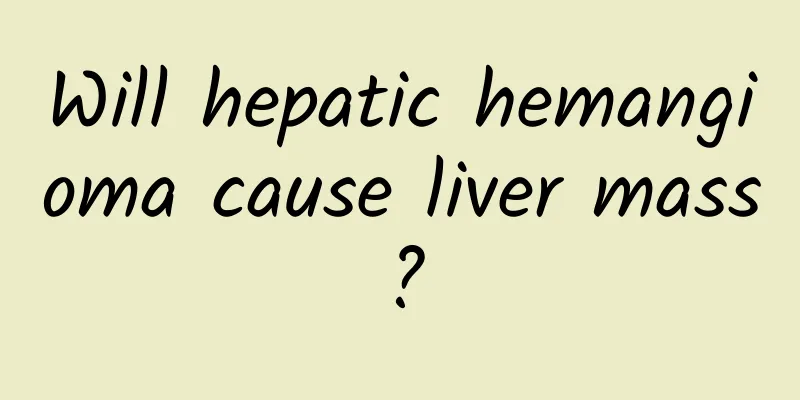Will hepatic hemangioma cause liver mass?

|
Hepatic hemangioma is a benign tumor, but we all know that the occurrence of these tumors should be taken seriously. Scientific treatment has been used to deal with it, but it often causes patients to experience various intestinal discomfort symptoms, such as nausea, vomiting, belching, etc. Sometimes the hepatic hemangioma may rupture and bleed, causing severe abdominal pain, shock and other hazards. 1. Hepatic hemangioma is a benign tumor of the liver. The most common type is hepatic cavernous hemangioma. It is usually solitary and occurs mostly in the right lobe of the liver; about 10% are multiple and can be distributed in one lobe or both sides of the liver. Hemangiomas appear as dark red or bluish-purple cystic bulges in the liver. Lobulated or nodular, soft, compressible, and most are clearly demarcated from adjacent tissues. The patient generally has no symptoms. The cause of hemangioma formation is unknown. This disease is more common in middle-aged women, and the incidence rate in women is 6 times that in men. Because this disease has no obvious symptoms and only manifests as space-occupying lesions in the liver, it is important to carefully differentiate it from liver cancer clinically. 2. Abdominal mass: The mass has a cystic feel, no tenderness, and a smooth or rough surface. Conducted vascular murmurs can sometimes be heard by auscultation at the mass. 3. Gastrointestinal symptoms: dull pain and discomfort in the right upper abdomen, as well as loss of appetite, nausea, vomiting, belching, fullness after eating, and indigestion may occur; 4 Compression symptoms: Giant hemangiomas can push and compress surrounding tissues and organs. Compression of the lower end of the esophagus may cause dysphagia; compression of the extrahepatic bile duct may cause obstructive jaundice and gallbladder effusion; compression of the portal vein system may cause splenomegaly and ascites; compression of the lungs may cause dyspnea and atelectasis; compression of the stomach and duodenum may cause digestive tract symptoms, etc. 5. Rupture and bleeding of hepatic hemangioma may cause severe upper abdominal pain, bleeding and shock symptoms. This is one of the most serious complications. It is mostly caused by rupture and bleeding of larger hepatic hemangiomas growing below the ribs due to external force. It is extremely rare. 6.Kasabach-Merritt syndrome is a coagulation abnormality caused by hemangioma accompanied by thrombocytopenia and consumption of a large amount of coagulation factors. Its pathogenesis is that blood is retained in giant hemangiomas, which consumes a large amount of red blood cells, platelets, coagulation factors II, V, VI, and fibrinogen, causing abnormal coagulation mechanism, which can further develop into DIC; |
<<: What are the symptoms of lupus erythematosus?
>>: What should I do if I have a cold due to lupus nephritis?
Recommend
Anterior shoulder pain
In daily life, when we move heavy objects, in add...
How to remove acne tumors
Comedonoma, also known as cyst, is a relatively c...
Is the Qing Palace dangerous?
During an artificial abortion, uterine cleaning i...
Recurrent allergic purpura
Improper use of drugs, pathogen infection and oth...
When is the best time to take calcium tablets?
Calcium tablets are a common type of calcium supp...
What are the symptoms of hernia in children? How to prevent it?
During the embryonic period, there is a "pro...
Why can't you extract teeth during menstruation?
There are two special stages in a woman’s life. O...
Can I eat spicy food after mole removal?
After removing a mole, you should pay attention t...
Wrong healing methods
I often have to exercise, so I often get some min...
Six rules for health care in autumn
More and more people are paying attention to heal...
What to do if you have stomach acid during pregnancy
It is very common for pregnant women to have stom...
Brown discharge after 10 days of induced labor
If a woman is pregnant and needs to have an abort...
Precautions after cupping
Cupping is a method commonly used in traditional ...
Do dried mulberries enhance sexual function?
The nutritional value of mulberry is still relati...
Medicinal effects and functions of Polygonatum sibiricum
Generally speaking, the medicinal value of Polygo...









